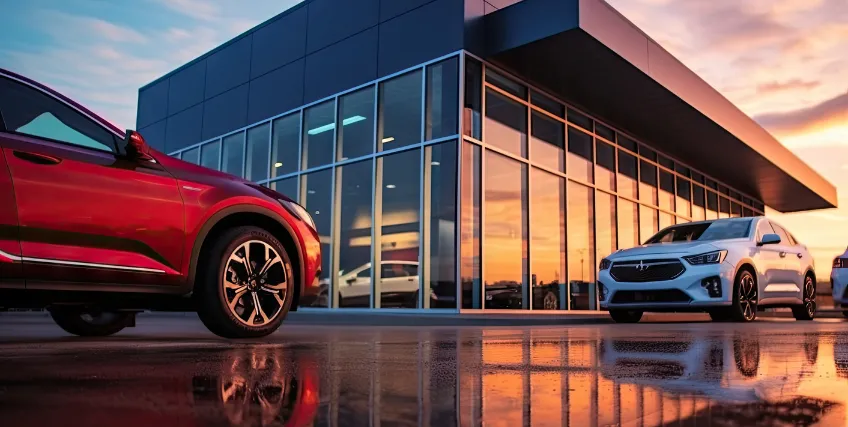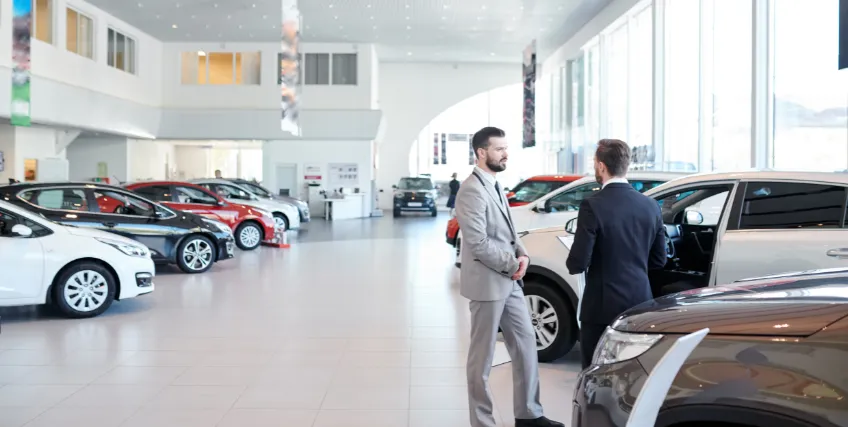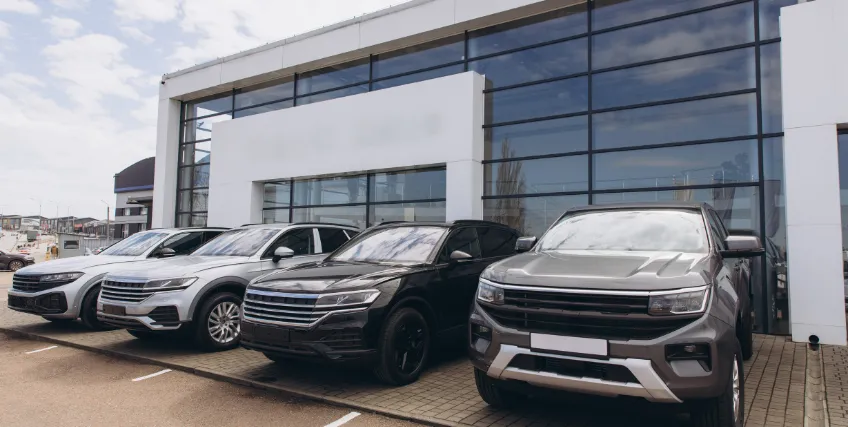Your Trusted Partner for Affordable
Car Dealership Loans
Secure the funds you need with Biz2Credit for car dealerships.
Looking for Business Financing?
Apply now for flexible business financing. Biz2Credit offers term loans, revenue-based financing, lines of credit, and commercial real estate loans to qualified businesses.
Set up a Biz2Credit account and apply for business financing
Key Insights About Car Dealership Loans
The financial landscape for car dealership loans presents a mix of unique challenges and significant opportunities for car dealers when compared to getting a loan for a car. Unlike many small businesses, financing a car dealership operates in a high-stakes environment where the costs of entry, inventory procurement, and ongoing operations can be substantial. Franchise dealerships often face hefty franchise fees, which can range from $30,000 for domestic brands like Ford to $500,000 for popular international manufacturers like Toyota and Hyundai.
For independent or specialty dealers, the challenges lie in securing sufficient capital to maintain a robust inventory and fund operational expenses such as showroom upkeep, staffing, and marketing. While manufacturers may offer short-term inventory financing, dealers frequently need secondary financing solutions for car dealership loans.
The U.S. boasts a dynamic car sales market, with a significant presence of both franchise and independent dealerships catering to a diverse customer base. By leveraging well-structured financing solutions, dealerships can expand their inventory, enhance customer offerings, and achieve long-term growth. The application process for securing car dealerships often requires a solid business plan, a good credit profile, and accurate financial documentation, emphasizing the need for readiness and strategic planning.
Why Choose Biz2Credit as the Top Choice for Car Dealership Loans?
Biz2Credit stands out as the go-to platform for car dealership financing solutions, offering unparalleled support adapted to the unique needs of car dealers. Operating in the competitive and capital-intensive automotive industry requires access to flexible and efficient financing solutions, and Biz2Credit delivers precisely that. Our platform combines cutting-edge technology with personalized service to streamline the best funding options, ensuring car dealers secure the funds they need without unnecessary delays.
What sets Biz2Credit apart is our commitment to transparency and speed. The platform’s user-friendly interface allows car dealers to apply for car dealership financing quickly, with minimal paperwork and rapid funding decisions. Moreover, our funding experts work closely with dealers to understand their financial goals, providing customized solutions that align with their business objectives. With access to numerous financing options, Biz2Credit ensures competitive rates and terms, empowering dealerships to maximize profitability and growth.
In an industry where time is money, Biz2Credit’s efficient funding process and expert guidance make us a trusted partner to finance car dealerships nationwide. By choosing us, dealers can focus on driving their business forward, confident in the knowledge that they have a reliable financial partner supporting their success. From independent operators to large franchise dealerships, we offer the expertise, resources, and flexibility needed to navigate the complexities of car dealership financing, making us the ultimate choice for dealers looking to grow and thrive.
Our Strengths:
- Repayment Simplicity We have simplified repayment options for car dealership loans with flexible repayment terms. See your loan payment schedule and make payments any time in your Biz2Credit account.
- Dedicated Funding Specialists Consult a funding specialist to determine what type of financing options for car dealerships fit your business best or get help at any time along the way as you complete our online funding application.
Breaking Down the Types of Car Dealership Loans
Car dealership loans are essential for helping dealerships grow and thrive in a competitive industry. These business loans for auto companies are specifically designed to meet the diverse needs of automotive businesses, providing financial support for inventory, operations, and expansion. Several loan types cater specifically to car dealers.
Floor plan financing is a popular choice, enabling dealerships to purchase vehicles in bulk, maintain a well-stocked inventory, and pay off the loan as cars are sold. Working capital loans help cover day-to-day expenses, such as payroll, rent, and marketing, ensuring smooth operations even during slower sales periods.
Business lines of credit offer flexible funding that can be drawn upon as needed, making them ideal for managing unexpected expenses or seasonal fluctuations. These provide lump-sum funding for significant investments like expanding facilities, upgrading equipment, car dealer marketing, or enhancing customer amenities.
SBA loans are government-backed options with competitive rates, ideal for smaller dealerships seeking long-term financing for expansion or improvements. Equipment financing can be utilized for purchasing or upgrading machinery, tools, and technology essential for operations. By choosing the right car dealership loan type, dealerships can maintain steady cash flow, invest in growth opportunities, and adapt to market trends. Understanding the terms, interest rates, and repayment options ensures that the financing aligns with business goals, making these loans a powerful tool for achieving sustained success.
Types of Car Dealership Financing Solutions Offered by Biz2Credit
Running and expanding a car dealership requires overcoming unique financial challenges. At Biz2Credit, we offer innovative funding solutions like term loans for stocking up on vehicles, revenue-based financing to help dealers tackle the demands of daily operations, and commercial real estate bridge loans for strategic growth. Whether you’re optimizing inventory levels, upgrading facilities, or planning for long-term success, our flexible car dealership financing options aim to meet the specific needs of automotive businesses.
1. Term Loans for Car Dealerships
A term loan financing solution can be a transformative option for car dealerships aiming to drive long-term growth. This type of financing offers a single upfront amount that is repaid over a fixed period, making it easier to plan your dealership’s financial future with predictable payments. It’s an ideal choice for significant investments such as expanding your showroom, upgrading technology, or opening a new location to reach more customers.
This flexible funding can also support enhancing your car dealer marketing efforts, hiring additional staff, or boosting working capital, enabling you to stock a more diverse inventory, attract more buyers, and deliver an exceptional customer experience. Biz2Credit’s affordable funding solutions are designed to align with your dealership’s goals, offering competitive terms, a seamless application process, and expert guidance to help your business thrive in today’s time.
Eligibility Criteria:
- A credit score of 650 and above.
- At least 18 months in business.
- Annual revenue of $250,000 or more.
2. Revenue-Based Financing for Car Dealerships
For car dealerships in need of adaptable funding, revenue-based financing offers a solution that works in accordance with your business’s sales performance. Instead of fixed monthly payments, your payment amount is calculated based on a percentage of estimated future receivables.
These finances for car dealership can help address a range of dealership needs, such as increasing inventory during peak demand periods, running promotional campaigns to boost customer traffic, or managing unforeseen expenses that arise in a dynamic market. Biz2Credit’s revenue-based financing provides fast access to capital, empowering your dealership to act quickly on opportunities or challenges without the strain of rigid repayment terms. Our flexible approach ensures your dealership has the financial agility needed to succeed and grow in a competitive automotive market.
Eligibility Criteria:
- A credit score of 575 and above.
- A minimum of 12 months in operation.
- Annual revenue of $250,000 or more.
3. Commercial Real Estate Loans for Car Dealerships
Car dealerships planning to expand, relocate, or upgrade their facilities can significantly benefit from flexible commercial real estate bridge loans. This type of car dealership financing supports acquiring new properties, refinancing existing obligations, or making major renovations to modernize your dealership and create a more inviting experience for customers. If you’re redesigning your current space to improve efficiency, this funding provides the capital to bring your vision to life.
Beyond property enhancements, it can also be used for strategic upgrades, such as expanding service areas, upgrading security systems to protect inventory, or creating customer-focused spaces like lounges or interactive showrooms. These improvements not only enhance operational efficiency but also elevate the customer experience, positioning your dealership for sustained growth and success.
At Biz2Credit, we offer competitive rates, and structured repayment plans to help you achieve your car dealership’s expansion goals while maintaining financial stability. Our experienced team provides personalized guidance to simplify the process, ensuring a seamless experience from start to finish.
Eligibility Criteria:
- A credit score of 650 and above.
- Minimum 18 months in business.
- Property as collateral.
- Annual revenue of $250,000 or more.
How Can you Utilize Car Dealership Loans?
Car dealership loans offer essential financial support to help your business manage day-to-day operations, invest in growth opportunities, and stay competitive in a dynamic market. Whether you’re looking to stock up on inventory, renovate your dealership, or improve customer service, the car dealership financing options can be utilized to meet your specific business needs. Here are some effective ways to utilize car dealership funding:
1. Inventory Management - Car dealerships can use financing to purchase vehicles in bulk, ensuring they have a wide range of models available to attract diverse customers. The best way to finance cars includes floor plan financing which is particularly useful for maintaining optimal stock levels without draining cash flow.
2. Facility Expansion or Renovation - If you're looking to expand your showroom, service center, or even move to a larger location, auto repair shop loans can help fund construction, renovation, and improvements, creating an inviting space for potential customers.
3. Marketing and Advertising - Marketing campaigns are essential for driving traffic and boosting sales. Car dealership loans can be used for advertising initiatives, whether it’s digital marketing, traditional advertising, or hosting events to promote new vehicle releases.
4. Working Capital Management - To handle seasonal fluctuations or unforeseen expenses, the car dealership loans help maintain day-to-day operations by covering payroll, utilities, and other essential costs during lean months.
5. Employee Expansion and Training - As your dealership grows, you may need to hire more staff or invest in training programs to enhance customer service and operational efficiency. Car dealership loans can support these staffing and training costs.
6. Upgrading Technology and Equipment - From dealership management software to vehicle maintenance tools, upgrading your technology and equipment can streamline operations, improve customer service, and enhance overall efficiency.
Trusted by Thousands of Small Business Owners in America.**
Simply because we get what you go through to build a business you believe in.
**Disclaimer: All stories are real, as told by real business owners. Customers do not receive monetary compensation for telling their stories.
From One Entrepreneur to Another: We Get You
We understand what's behind building a business you believe in.
All stories are real, as told by real business owners. Customers do not receive monetary compensation for telling their stories.



Articles on Car Dealership Loans
Car Dealership Business Loans: Tips to Qualify and Grow Your Dealership
Successfully running a car dealership requires more than just a good location and a lineup of great vehicles. You’ll also need substantial financial support...
How Dealership Financing Works What Every Buyer Should Know
When you select the option of dealership financing, you use the dealer as an intermediary between the lender and you. Generally, this
How to Improve Cash Flow in Your Car Dealership with Smart Financing
Car dealerships need healthy cash flow to keep the business operating smoothly. Cash flow is how money moves in and out of your business...
FAQs on Car Dealership Loans
1. What are the key factors to consider when choosing financing for a car dealership?
When choosing among the various financing options for a dealership, car dealers should consider factors such as the amount of capital needed, repayment terms, interest rates, and how the car dealership financing aligns with their specific goals (e.g., inventory purchase, expansion, or marketing). Additionally, understanding the type of collateral required and the flexibility of repayment schedules is crucial in making the best decision for your business.
2. How can car dealerships qualify for financing?
Financial platforms typically look at factors like credit history, business revenue, years in operation, and the overall financial health of the dealership. Having a solid business plan, a good track record of managing cash flow, and a strong inventory management strategy can improve the chances of securing business loans for auto companies.
3. What can car dealership loans be used for besides inventory?
While inventory purchase is a primary use for car dealership loans, funds can also be used for expanding or renovating your dealership, marketing, and advertising efforts. These also include enhancing technology systems, upgrading equipment, managing seasonal cash flow, and even expanding staff or training programs to improve service.
4. What are the repayment terms for car dealership loans?
Repayment terms for car dealership loans vary depending on the type of financing and the financial institution. For instance, term loans have fixed monthly payments over a set period. It’s important to review the interest rates, repayment schedules, and flexibility of terms to ensure they align with your dealership’s cash flow and long-term goals.
Frequent searches leading to this page
Term Loans are made by Itria Ventures LLC or Cross River Bank, Member FDIC. This is not a deposit product. California residents: Itria Ventures LLC is licensed by the Department of Financial Protection and Innovation. Loans are made or arranged pursuant to California Financing Law License # 60DBO-35839



